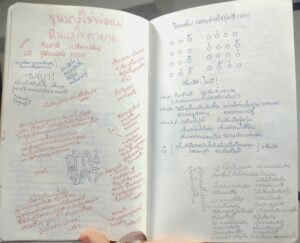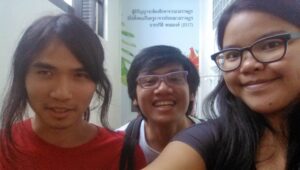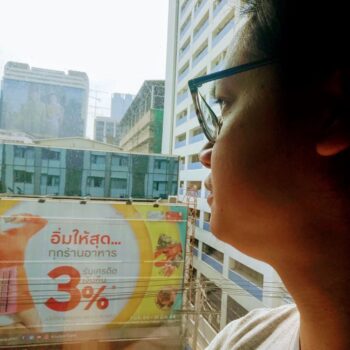
ฉันเริ่มต้นเป็นคนไทยจริงๆ เมื่อปี 53 ปีนั้นเป็นปีที่ฉันจากประเทศไทยไปสหรัฐอเมริกาหลังจบม.หก คนเราจะเริ่มรู้สึกลึกซึ้งว่าตัวเองเป็นคนที่ไหนก็เมื่อเราจากที่แห่งนั้นมาแล้วสินะ
ฉันเริ่มต้นเป็นคนรื้อรากถอนโคนทางการเมืองก็ปี 53 เช่นกัน ปีนั้นเป็นปีสลายการชุมนุมคนเสื้อแดงด้วยใบอนุญาตฆ่าจากชนชั้นสูงและชนชั้นกลางฝั่งอนุรักษนิยม ระหว่างที่เกิดการล้อมปราบ ฉันช็อคกับปฏิกิริยาบนเฟซบุ๊คของเพื่อนร่วมชั้นเรียนสามสี่รายที่ทำราวกับว่าคนเสื้อแดงไม่ใช่คน ช่วยไม่ได้ที่เรื่องแบบนี้มันไม่ลืม
เรียงความเรื่องนี้จะพาท่านย้อนรอยการรื้อราก-เป็นไทยของตัวฉันเองด้วยจุดประสงค์ที่จะย้อนรอยคำบริภาษทางการเมืองตั้งแต่ ‘ลิบเบอร่าน’ ‘ซ้ายจัดดัดจริต’ ไปจนกระทั่ง ‘ไทย’ โดยฉวยมันมาใช้สร้างพลังและความรู้จักตัวเองของพวกเราทุกคนแทน สามแนวคิดที่ร้อยเรียงความเรื่องนี้เข้าด้วยกันคือความกระหายทางปัญญา ศรัทธาในชาติบ้านเมือง และจริตแค้มป์
ลิบเบอร่านอาร์ตส์
หลังปี 53 การแบ่งฝักฝ่ายการเมืองไทยผ่าเข้าไปถึงโลกของนักเรียนทุนเล่าเรียนหลวงระดับปริญญาตรีที่สหรัฐอเมริกา (รู้จักกันในชื่อ ‘ทุนคิง’ เป็นทุนให้เปล่าจากภาษีประชาชน 9 ทุนต่อปี เลือกเรียนที่ไหนก็ได้ในโลก) ช่วงสองสามปีหลังจากนั้นการเลือก–หรือไม่เลือก–มหาลัยของเด็กทุนคิงกลายเป็นมีมิติเรื่องการเมืองมาพ่วง กล่าวคือถ้าเธอปฏิเสธคำตอบรับจากมหาลัยไอวี่หลีกอย่างฮาร์เวิร์ดหรือโคลัมเบียหรือสถาบัน ‘ชั้นเดียวกัน’ อย่างสแตนเฟิร์ด เพื่อไปเข้าสถาบันลิเบอร่อลอาร์ตขนาดเล็ก เธออาจทำให้รุ่นพี่บางคนไม่พอใจ จนตีความได้เป็นสเตทเม้นท์ทางการเมืองภายใน ไม่เชิงแถลงการณ์ว่าฉันเป็นแดงไม่ใช่เหลืองอย่างเธอ หรือฉันเป็นซ้ายไม่ใช่ขวาอย่างเธอ แต่เป็นการเมินเครือข่ายที่บ่งบอกจริตภายในใจลึกๆ ตั้งแต่ก่อนที่มันจะออกดอกเป็นสีแดงๆ ในสำนึกรู้ต่อมาของเจ้าตัว บรรยากาศนี้ส่งผลให้เกิดภาพจำในหมู่นักเรียนทุนคิงและทุนอื่นๆ ว่าพวกลูกอีช่างเถียงมักจะกระจายกันไปอยู่ตามสถาบันลิเบอร่อลอาร์ตส์ เป็นภาพจำของพวกเอะอะก็จะปลดแอกในทำนองคำว่า ‘ลิบเบอร่าน’ นั่นเลย
ฉันอยากรู้จักการศึกษาแบบลิเบอรัลอาร์ตตั้งแต่วันที่ได้ล่วงรู้ว่ามีสิ่งนี้อยู่ในโลก ตอนนั้นฉันอยู่ม.5 มีศิษย์เก่ารุ่นใกล้สองสามคนมาแนะแนวเรื่องการสอบชิงทุนไปเรียนป.ตรีที่อเมริกา จากที่รู้สึกค่อนไปทางแอนตี้เพราะเห็นเพื่อนฝูงซุ่มเตรียมสอบทุนคิงกันอย่างเอาเป็นเอาตายมาตั้งแต่เริ่มเรียนม.4 ที่เตรียมอุดมฯ (ที่ฉันตามผู้ชายไปเรียน) ก็ต้องหูผึ่งเมื่อได้ยินว่ามหาวิทยาลัยอเมริกันไม่บังคับให้นักศึกษาเลือกวิชาเอกจนกว่าใกล้จะจบปีสอง แล้วก็ต้องตาโตเมื่อเห็นคำ critical thinking เอย small class size เอย active class discussions เอย โปรยอยู่บนสไลด์แนะนำสิ่งที่เรียกว่า Liberal Arts College จบการแนะแนววันนั้นฉันจึงได้คิดว่า ‘ไอ้ทุนคิงเนี่ยะ ทำไมเราไม่แข่งกับเขาดูซักตั้งล่ะ?’
ฉันเรียนสายวิทย์-คณิต แต่ความฝันตอนนั้นคืออยากเป็นกวี ลิเบอรัลอาร์ตคอลเลจมันหอมหวานก็ตรงที่คำว่า ‘แต่’ ในประโยคเมื่อกี๊จะไม่จำเป็น ใช้คำว่า ‘และ’ แทนได้เลย มันรู้สึกไม่ใช่อ่ะที่ต้องตัดสินใจว่าจะเอาวิศวะคอมฯ หรือจะเอารัฐศาสตร์ตั้งแต่ก่อนได้คบหาดูใจกัน ฉันอยากมีประสบการณ์ที่มันดูดดื่มกว่านั้น สำส่อนกว่านั้น เพื่อฉันจะได้รู้จริงๆ ว่าวิชาไหน(บ้าง)ล่ะที่คู่ควรให้ทุ่มเท

พอได้ทุนฯ สายคณิต-ภาษา ฉันก็เลือกไปสหรัฐอเมริกาด้วยความมุ่งหมายที่จะเข้าเรียนมหาลัยลิเบอรัลอาร์ตซักแห่ง พวกเรานักเรียนทุนรัฐบาลไทยในสหรัฐฯ ตามปกติแล้วจะถูกส่งเข้าโรงเรียนประจำโรงเรียนละคนสองคนเป็นเวลาหนึ่งปีการศึกษาเพื่อปรับพื้นฐานและเตรียมการสมัครเข้ามหาลัย ปีนั้นแหละที่ฉันได้ลิ้มรสการศึกษาแนวเสรี บรรยากาศการเรียนเปิดโลกอย่างยิ่ง ได้เลือกวิชาเรียนเองเกือบทั้งหมด ได้ห้องเรียนที่มีกันอยู่หกคน หรืออย่างมากก็ไม่เกินยี่สิบ ได้ฝึกคิดเชิงวิพากษ์ผ่านการอ่านหนังสือคลาสสิคๆ ของตะวันตก และได้ใช้หัวใจเขียนเรียงความส่งครูชิ้นแล้วชิ้นเล่า แต่ด้านกลับของมันก็คือบรรยากาศการเข้าสังคมปิดโลกอย่างยิ่ง นักเรียนชายอย่างฉันต้องผูกเนคไทสวมเบลเซอร์เข้าเรียน ต้องร่วมฟอร์ม่อลดินเนอร์ตามโต๊ะที่กำหนด ต้องเล่นกีฬาหรือกิจกรรมเสริมช่วงบ่ายแบบชนชั้นสูงนิวอิงแลนด์ จนถึงต้องรู้กฎยิบย่อยเกี่ยวกับการใช้เวลากับผู้สาวสองต่อสองในหอพัก นอกห้องเรียนมีน้อยคนที่ฉันรู้สึกสนิทพอจะเปิดอกคุยด้วยจริงๆ ไม่ว่าเพื่อน โค้ช หรือครู
ฉันจึงตั้งปณิธานแน่วแน่ว่าจะไม่เข้ามหาลัยที่มีบรรยากาศอุดอู้แบบอีลีทอนุรักษนิยมแบบนั้นเด็ดขาด ซึ่งจากที่ได้ไปเยี่ยมและไปสืบมา มหาลัยไอวี่หลีกทุกแห่งและแม้แต่ม.ลิเบอรัลอาร์ตบางแห่งก็ดูจะอีหรอบเดียวกัน วิธีที่ฉันใช้คัดออกคือดูว่าที่นั่นมีกลุ่มนักเรียนไทยที่อยู่กันเหมือนไม่เคยออกจากไทยหรือเปล่า (ไทยในความหมายสถานะจิต ไม่ใช่สถานที่) ไม่แปลกใจที่ฉันตกล่องปล่องชิ้นกับสว้าธมอร์วิทยาลัย สุดยอดแหล่งเพาะพันธุ์ Social Justice Warrior (คำเหน็บแนมนักสู้เพื่อสังคมเป็นธรรม) ฉันตกหลุมสุนทรียะที่เหวี่ยงไปสุดอีกทาง กางเกงวอร์มหลวมๆ ในห้องเรียน ผมเผ้ากระเซอะกระเซิง รังสีความเควียร์กระเจิงในอากาศ นี่แหละคนแบบที่ฉันต้องการเรียนรู้ด้วย
ในจำนวนสิบสถาบันที่สมัครไป ฉันใส่มหาลัยไอวี่หลีกไว้เผื่อเลือกสองแห่ง ปรากฏว่าฉันติดหนึ่งในนั้น ถึงตอนนั้นฉันรู้แล้วว่าถ้าเอื้อมถึงไอวี่หลีกแล้วเมิน ก็จะถือเป็นการประพฤติตนนอกรีตนอกรอยในสายตาผู้พิทักษ์เกียรติทุนคิงบางคน
มองย้อนกลับไปแล้วรู้สึกว่าทั้งฉันทั้งพวกเขางี่เง่าพิกล จริงสินะ ที่มาของคำว่า ‘ลิเบอรัล’ ในลิเบอรัลอาร์ตก็หมายถึงพวกเจ้าขุนมูลนายที่มีเวลาว่างพอจะศึกษาอะไรที่ไม่จำเป็นต้องเอาไปใช้จริง เป็น ‘เสรีชน’ ไม่ใช่ ‘ไพร่’ ที่มีการศึกษาอาชีวะแยกออกไปต่างหาก เอาเข้าจริงสถาบันลิเบอรัลอาร์ตเกือบทั้งหมดที่ฉันสมัครไปก็นับอยู่ในกลุ่มสถาบัน ‘ลิตเติ้ลไอวี่ส์’ ที่มีมาตรฐานวิชาการและเกียรติภูมิทางสังคมคือๆ กันกับสถาบันไอวี่หลีกนั่นแหละ แค่มีนักเรียนน้อยกว่าและไม่มีสอนระดับโท-เอกเท่านั้น ตัวชี้ขาดคงไม่ได้อยู่ที่ประเภทมหาลัย แต่อยู่ในวิธีหาทางไปของแต่ละคนในสี่ปีนั้นมากกว่า
และแน่นอนว่าการเข้าเรียนหลักสูตรลิเบอรัลอาร์ตไม่ได้รับประกันว่าจะได้การศึกษาเปลี่ยนชีวิตอย่างที่หัวใจเรียกร้องต้องการ ปัจจัยสำคัญคือดวงและจังหวะ
ฉันดวงดีที่ได้เจอเพื่อนหลากหลาย และจังหวะก็สนองนี้ดพอดี วิชาเรียนที่ฉันเลือกลงในแต่ละเทอมบังเอิญเด้งรับกันกับการเจริญพันธุ์ความคิดจนมีคอร์สเปลี่ยนชีวิตแทบไม่ซ้ำสาขาวิชา ส่วนการวิจารณ์สถาบันกษัตริย์ไทยและกิจกรรมนักศึกษาสว้าธมอร์ก็เร่าร้อนถึงจุดสูงสุดพร้อมๆ กันในช่วงปี 54-56 การแตกขั้วที่เกิดขึ้นทั้งสองโลกระเบิดความคิดความอ่านให้ลิ่วไปทั้งในและนอกห้องเรียน ฉันดูดกลืนพลังทั้งหมดนั้นด้วยดำฤษณาร้อนแดงที่จะทะยานสูงขึ้นไป ที่จะผลักพรมแดนที่ขีดคั่น ที่จะเป็นทุกสิ่งที่ฉันสามารถปีนป่ายไปเป็น
ไม่ควรมีใครต้องถูกตีตราแต่แรกเพราะเลือกไปเรียนที่ที่ชวนให้ฝากความหวังว่าจะได้รับการศึกษาเปลี่ยนชีวิตมากกว่าที่อื่น แต่ฉันก็รู้สึกโชคดีที่ได้ฝึกขึ้นสังเวียนในช่วงสองสามปีนั้นที่ลิเบอร่อลอาร์ตอิ๊สซึ่มคือกาลกิณี เคราะห์ดี(ละมั้ง)ที่วันนี้ไม่ได้เป็นแบบนั้นแล้ว
ทุกวันนี้ลิบเบอร่านไม่ใช่เสียงส่วนน้อยมากในหมู่นักเรียนทุนฯ อีกต่อไป พวกเขามีเพื่อนฝูงให้เกาะเกี่ยวกันไปมากขึ้น ส่วนสถาบันลิเบอรัลอาร์ตก็กลายเป็นกระแสหลักมากขึ้น พร้อมกับที่การวิจารณ์สถาบันฯ ดูจะระบาดไปโดยไม่เกี่ยงสถาบันการศึกษา อยากรู้เหมือนกันว่าพวกเขาจะรวมหัวทำอะไรขึ้นมาได้บ้างอย่างที่รุ่นฉันทำไม่ได้หรือไม่ได้ทำ
เมื่อย้อนคิดถึงตอนนั้น ฉันเห็นได้ว่านอกจากแคะโลกทัศน์เก่าออกไปเพื่อรับสิ่งใหม่เข้ามา ฉันยังกำลังเรียนรู้ความเป็นไทยเสียใหม่ด้วย อันที่จริงการจะสลัดคราบความเป็นไทยไปจากตัวไม่ควรเป็นเรื่องที่ต้องคิดหลายตลบสำหรับคนที่เคยถูกบอกว่า ‘ไม่รักพ่อก็ออกจากบ้านของพ่อไปซะ’ แล้วต่อมาผ่านการชุบตัวที่เมืองนอก สู้โต้ไปว่าฉันรู้สันดานไทยๆ หมดไส้หมดพุงแล้ว เรื่องอะไรจะโง่อยู่เป็นฝุ่นใต้ตีนของประเทศห้ามพัฒนา สู้ตอกกลับว่า ‘ออกมาแล้วคุณภาพชีวิตดีจะตาย ดูสิ จะสมน้ำหน้าใครดีนะ บรัยยย’ ก็น่าจะชอบด้วยเหตุผลมากกว่า แต่ฉันดันไม่อยากพูดอย่างนั้น ส่วนหนึ่งเพราะรู้สึกมาตลอดว่าสหรัฐอเมริกามีปัญหาฝังลึกยิ่งกว่า และนึกภาพไม่ค่อยออกว่าตัวเองจะเป็นพลังช่วยให้มันดีขึ้นหรือไม่แย่ลงไปกว่าที่เป็นอยู่ได้ยังไงเมื่อเทียบกับที่ไทย
ไม่ตรงความจริงเท่าไหร่ถ้าจะใช้คำว่า ‘ตาสว่าง’ มาอธิบายจุดเปลี่ยน เรียกว่าการกลับมาค้นพบและหลงเสน่ห์รากเดิมจะถูกกว่า มากกว่ากบที่ได้หลุดจากกะลาแลนด์ออกไปสู่การเป็นพลเมืองโลก สิบปีนี้ของฉันยังคงครอบไว้ด้วยความเลื่อมใสในชาติบ้านเมือง
ทำตามศรัทธา
ฆอร์เฆ ลวิส บอร์เฆส เสนอแนวคิดว่าการเป็นคนชาติหนึ่งๆ หมายถึงการทำตามศรัทธา ในเรื่องสั้น “Ulrica” พระเอกแนะนำตัวกับนางเอกว่าเขาเป็นอาจารย์ที่โบโกตา แล้วเสริมว่าตนเป็นคนโคลอมเบีย จากนั้นบทสนทนาสั้นๆ ก็ทะลุขึ้นมาแทรกบทบรรยาย
—เป็นคนโคลอมเบียคืออะไรหรือ?
—ไม่รู้สิ —ผมตอบ— เป็นการทำตามศรัทธาน่ะ
—เหมือนการเป็นคนนอร์เวย์สินะ —เธอพยักหน้า
‘การทำตามศรัทธา’ ที่ว่าคืออะไรกัน? เมื่อเรียกอัตลักษณ์ชาติเป็น การทำ ย่อมหมายความว่ามันเป็นการจงใจ มิใช่มีติดตัว และเมื่อบอก ตามศรัทธา ก็บ่งว่ามันเดินตามสิ่งที่อยู่พ้นตรรกะ วลีภาษาสเปน acto de fe ยังมีนัยของการกระโจนลงทำสิ่งที่เหตุผลไม่อาจพิสูจน์ด้วย การผูกชะตาตนเข้ากับประเทศชาติจึงเป็นการยังยืนยันจะยึดถือบางสิ่งทั้งที่เหตุผลประดามีบอกว่าอย่าเลย
วิธีมองอัตลักษณ์ชาติแบบนี้ใช้ได้ทั่วไปไหม หรือจำกัดเฉพาะบางชาติ? สืบพบว่าโคลอมเบียกับนอร์เวย์มีจุดร่วมสำคัญทางประวัติศาสตร์อยู่สองอย่าง คือทั้งสองประเทศตกอยู่ใต้อิทธิพลทางวัฒนธรรมของที่อื่น โคลอมเบียมีภาษาที่รับมาจากสเปน ส่วนนอร์เวย์ก็มีภาษาเขียนที่รับมาจากเดนมาร์ก ทั้งสองประเทศยังเคยมีอำนาจเหนือดินแดนกว้างใหญ่ไพศาลดังที่รู้จักกันในชื่อ Gran Colombia และ Greater Norway จุดร่วมทั้งสองชวนให้นึกถึงชาตินิยมไทยแบบที่มีปมด้อยทางวัฒนธรรมและหมกมุ่นกับการเสียดินแดน ในแง่นี้การสมาทานความเป็นไทยช่างดูหลงผิด
แต่ฉันก็ไม่ปล่อย ส่วนหนึ่งเพราะยังคงรักภาษาที่ถูกสอนมาว่าเป็นสมบัติสำคัญของความเป็นไทย ตอนที่ฉันวิจารณ์การบังคับให้บูชาในหลวงลงหน้าเฟซบุ๊คเมื่อวันที่ 5 ธันวา ปี 54 ฉันก็เขียนเป็นกลอนสุภาพ นี่ละมั้งฉันถึงไม่สะทกสะท้านเท่าที่ควรตอนที่โดนเพื่อน-พี่-ผู้ปกครองในโลกทุนคิงตำหนิว่าอกตัญญู
อาจค้านได้ว่าไม่เห็นต้องคิดซับซ้อน แค่รักเพราะมันเป็นบ้าน เป็นความรักบ้านเกิดที่เป็นไปเอง ไม่ต้องแบกอะไรทางอุดมการณ์ก็ได้นี่ แต่หลังปี 53 มาจะให้ยึดถือความเป็นไทยแบบใสซื่อมันก็ยังไงๆ อยู่
เมื่อจะกอดไว้ก็ไม่ได้ จะปล่อยก็ไม่ยอม ฉันเลยจำเป็นต้องปะติดปะต่อต้นตำรับความเป็นไทยอีกแบบเอาเอง ในวัยนั้นฉันจึงเห็นตัวเองไปทั่วทีปทั่วแดน ดูธเนศ อาภรณ์สุวรรณสิ เค้าเคยทำ’ซีนการต่อสู้ของนักศึกษาเหมือนเรา แถมยังได้เข้าเรียนหลักสูตรลิเบอรัลอาร์ตที่อเมริกาอยู่ช่วงนึงด้วยนะ! ดูพีระ สุธรรมสิ ชื่อเหมือนเราไม่พอเส้นทางชีวิตเค้ายังเหมือนอีก แต่เกิดก่อนเราตั้งห้าสิบปีแน่ะ! มีการจิ้นว่าเจ้าคือทายาทคนต่อไปทำนองนั้นอยู่เรื่อย พวกเค้าเหล่านั้นเป็นเสมือนลายแทงสู่มรดกความเป็นไทยอีกสายพันธุ์ที่ถูกทำให้หายไป
ฉันคือราษฎรผู้กระหายน้ำคนนั้นเลยที่ปรีดีพูดถึงตอนเขาเนรมิตมหาวิทยาลัยสำหรับสามัญชนสยามขึ้นมาในทศวรรษ 2470 ‘มหาวิทยาลัยย่อมอุปมาประดุจบ่อน้ำบำบัดความกระหายของราษฎร ผู้สมัครแสวงหาความรู้อันเป็นสิทธิและโอกาสที่เขาควรมีควรได้ตามหลักแห่งเสรีภาพในการศึกษา’

แน่นอนว่าตุ๊ดน้อยกลอยใจอย่างฉันไม่ได้เป็นราษฎรในอุดมคติของปรีดี แต่ฉันก็ไม่ได้รู้สึกอกหักเมื่ออ่านเจอว่าปรีดีขี้เดียดตุ๊ดยังไง แบบเดียวกับที่เบล ฮุคส์ ไม่ได้เลิกนับถือเปาลู แฟรรี (ผู้เขียน การศึกษาของผู้ถูกกดขี่) เพราะแนวคิดเหยียดเพศของเขา:
ฉันเหมือนคนกำลังจะขาดน้ำตายเมื่อแรกเจอเปาลู ข้อที่ว่ามีโคลนปนอยู่ในน้ำที่ฉันเจอก็ไม่สลักสำคัญ ฉันคิดเอาว่าแนวคิดเหยียดเพศของเขาเป็นเหมือนเศษโคลนเพราะความกระหายของฉันมันแสนสาหัส ฉันแยกเอาส่วนที่ดีต่อใจฉันไว้และผ่อนปรนต่อแง่ที่เป็นพิษ ขณะที่ฉันคิดว่าเฟมินิสต์ผิวขาวจำนวนมากที่มาจากคนละตำแหน่งแห่งที่ (ไม่ได้มาจากจุดที่กระหายในแบบเดียวกับฉันละมั้ง) รู้สึกแรงกว่ามากว่าตัวเองทำใจเข้าถึงส่วนที่ดีต่อใจไม่ได้เพราะติดอยู่กับด้านลบหรือมลทิน
ท่านอาจท้วงว่าทำแบบนี้มันเข้าข่ายบูชาตัวบุคคล เป็นภาพในกระจกของลัทธิรอยัลลิสต์ตัวปัญหานะ แต่ฉันอยากขยายความว่าไอด้อลของฉันเป็นอย่างศาลพระภูมิที่บังเอิญพบเข้าตามรายทางจาริก ที่ฉันไปด้อมๆ มองๆ หยิบขวดแฟนต้าแดงมายกดื่มอย่างรู้คุณ แล้วอีกซักพักก็ออกเดินทางต่อไป ถ้าเกิดวันหนึ่งได้รู้เข้าว่านั่นเป็นไอด้อลกะล่อนกำมะลอ…ก็แล้วไง? ฉันได้แร่ธาตุที่จำเป็นมาแล้ว ผงฝุ่นใบไม้ถ้าสำลักออกไม่ทัน ก็ให้ตับไตช่วยชำระสารตกค้างได้ไม่ยากเกิน
แต่ก็จะเป็นการโกหกกันถ้าไม่บอกว่าฉันมีวิกฤตศรัทธามาแล้วหลายครั้งหลังพบว่าตัวเองสำคัญผิด สิบปีผ่านไป การจาริกแสวงหาสรณะทางใจของฉันเหมือนหมดทางไปต่อ เดี๋ยวนี้รอยเท้าผู้มาก่อนเหมือนมีไว้เทียบรอยมากเสียกว่าเจริญรอยตาม ฉันเรียนรู้ที่จะสนุกกับสัญชาตญาณคนนอกของตัวเองมากขึ้น ศึกษาและถอดบทเรียนคนอื่นได้มากขึ้นโดยไม่จำเป็นต้องรู้สึกว่าเขาเหมือนเรา
จากการทบทวนทศวรรษที่ผ่านมาของนักกิจกรรมเพื่อประชาธิปไตย ฉันสัมผัสได้ถึงทำนองที่เวียนซ้ำของการ ‘สู้ตาย’ ในความหมายของการดันทุรังสู้ทั้งที่รู้ว่าจะแพ้ อย่างเก่งก็ได้เปิดแผล และต่อให้ย้อนเวลากลับไปแก้จุดที่ตัวเองพลาดได้ก็ไม่ชนะอยู่ดี ตรงนี้เองที่วลีทำตามศรัทธาหรือ acto de fe เผยเงาทะมึนของยุคคลั่งศาสนาของสเปนที่เขียนวลีนี้ว่า ‘auto de fe’ โดยใช้หมายถึงพิธีเสียบประจานคนนอกรีตคาทอลิกเช่นการจับมัดเสาเผาทั้งเป็น สำหรับคนไทยหลายคนที่มีสำนึกรักชาติบ้านเมืองอย่างแรงกล้า การทำตามศรัทธาอย่างไม่เกรงหน้าอินทร์หน้าพรหมได้นำไปสู่การถูกลงทัณฑ์ถึงตาย ดังเช่นที่การปราศรัยครั้งสุดท้ายของดารณี ชาญเชิงศิลปกุลสะกิดเตือน:
ถ้ามันยังไม่สุกงอม อย่าทำเหมือนพี่ พี่เอาไม้ขีดไฟโยนเข้าไปในป่าที่ยังเปียกน้ำ สุดท้ายไฟก็ไม่ลุก พี่ก็เจ็บตัวฟรี เพราะพี่มองสถานการณ์ผิดพลาด […]
พี่ถึงจำเสมอว่า ไม้ขีดไฟของพี่จะไม่โยนเข้าไปที่ต้นไม้ที่ยังเปียก พี่จะรอให้มันแห้ง แล้วค่อยโยน ถึงวันนั้นแม้โยนเข้าไปแล้วพี่จะตาย พี่ก็โอเค แต่ตายแล้วต้องขอให้มันสำเร็จนะ จะไม่ตายฟรี ไม่เอา นี่แหละคือสิ่งที่พี่อยากจะฝากให้กับคนที่มีหัวใจรักประชาธิปไตย รักความถูกต้อง
บทเรียนเรื่องยุทธวิธีและยุทธศาสตร์ของดารณีทำให้ฉันได้คิดสองอย่าง อย่างแรก ความหวังที่แท้จริงในการเปลี่ยนแปลงสังคมอยู่พ้นวิสัยของศรัทธาส่วนบุคคล แต่อยู่ในเจตจำนงส่วนรวม อย่างที่สอง ทางไปหน้าคือต้องถอยมาก้าวหนึ่งเพื่อปูพื้นความคิดความอ่าน เพื่อที่ว่าเมื่อเวลานั้นมาถึง การจุดไฟเผาเผด็จการจะกลายเป็นสามัญสำนึกสำหรับชาวไทยจำนวนมากพอ
แค้มป์ของพวกซ้ายจัดดัดจริต
ฉันติดใจคำว่า ‘ซ้ายจัดดัดจริต’ ตั้งแต่ครั้งแรกที่ผ่านตาในปาฐกถาปี 62 ของผบ.ทบ.อภิรัชต์ คงสมพงษ์ มันติดหูในจังหวะคล้องจองและการเอื้อมสัมผัสอักษรอย่างสะสวยระหว่างจัดกับจริต ช่างไม่คู่ควรเอาซะเลยกับสถานะของคำบริภาษหลงยุคต่อผู้นิยมประชาธิปไตยที่ถูกมองว่าเป็นพวกหัวนอกและดังนั้นจึงขาดความเป็นไทย ฉันรู้สึกเสน่หาคำนี้ มันชวนให้นึกภาพตัวเองตอนอายุสิบแปด เป็นไม้อ่อนที่ยอมให้ดัดและพร้อมดัดแปลงตนเองให้ queer ให้นอกลู่นอกรอยอย่างตรงใจ
ว่าแต่สิบปีที่ฉันได้เรียนรู้แบบเอียงไปทางซ้ายมันเข้าข่ายดัดจริตไหม? ในด้านหนึ่งมันเป็นธรรมชาติที่สุด ราวกับจริตการวิพากษ์วัฒนธรรมนั้นฝังแน่นอยู่ในจิตวิญญาณมาแต่ไหนแต่ไร ไม่ได้เสแสร้งเอา แต่ในอีกด้านหนึ่ง งานที่ผ่านมาของฉันก็เป็นการจีบปากจีบคอแบบพวกวอนนาบีที่พยายามเหลือเกินที่จะบีลอง เอาสองด้านนั้นมาประกบกันก็คงเรียกมันได้ว่า camp
การบอกว่าอะไร ‘แค้มป์’ หมายถึงการเห็นว่ามันช่างไร้รสนิยมจนเข้าขั้นรสนิยมอีกแบบ ลักษณะสำคัญของแค้มป์ที่ฉันเข้าใจคือความจริงจังที่ล้มเหลวจนเผยความประดิษฐ์ออกมาโดย(เหมือน)ไม่ตั้งใจ ชวนให้นึกถึงคำภาษาไทย ‘แกล้ง’ ที่โบราณแปลว่าตั้งใจ แต่สงสัยตั้งใจเกินจนนานเข้าๆ พลิกมาหมายความว่าทำไม่ตรงกับใจเฉยเลย โดยทั่วไปเวลาพูดถึงแค้มป์แล้วคนมักจะนึกถึงเกย์หรือกะเทยที่เลียนจริตจะก้านการแสดงตัวตนทางเพศของ ‘ชายจริงหญิงแท้’ แต่ความแค้มป์เป็นสิ่งที่สัมผัสได้ในทุกการแสดงอัตลักษณ์ ไม่ว่าจะเป็นทางชาติพันธุ์ ชนชั้น หรืออุดมการณ์ นอกจากจะเป็นวิธีมองสิ่งรอบตัว แค้มป์ยังสามารถเป็นวิธีปรุงแต่งความ(ไม่)เป็นตัวเองเสียใหม่ในท่ามกลางการถูกสังคมปฏิเสธและยัดเยียดอัตลักษณ์ แค้มป์คือการทำตัวราวกับตนบีลองทั้งที่ตัวไม่ลงร่องหรือกระทั่งไม่ลงรอย แค้มป์ป่วนเส้นแบ่งแท้-เทียม เพราะแค้มป์ไม่เพียงเปิดโปงความไม่ใช่ธรรมชาติของลักษณะตัวตน แต่เพราะการเปิดโปงนั้นยังเจือความสำราญขนานแท้ด้วย ความเป็นไทยของฉัน (เช่นเดียวกับความเป็นอีสานของฉัน) เป็นการลงแรงปลูกปั้นอย่างเอาจริงเอาจังเสมอมา กระนั้นมันก็ยังออกอาการกลั้นขำเหมือนรู้ตัวอยู่ตลอดว่ามีสิทธิ์พังครืน

อาจเข้าท่าถ้าเราลองแกล้งออกทะเลไปกับสิตางศุ์ บัวทอง เน็ตไอด้อลเจ้าของวาทะ ‘เฟซบุ๊ค “สิตางศุ์ บัวทอง” ที่เป็นภาษาอังกฤษ ไม่จริง ทุกคนรู้ แฟนคลับรู้ ฉันใช้ภาษาไทยตลอด เพราะฉันคือคนไทย และคนไทยแปลว่าอิสระ ฉันไม่ยอมไปเป็นทาสคุณหรอกค่ะ’ ที่ระบาดไปทั่วสังคมออนไลน์ไทยอยู่ช่วงหนึ่ง
วาทะนี้จั๊กจี้สมองตรงคำนิยามคนไทยที่ผิดจากความเป็นจริงอย่างสิ้นเชิง ตรงที่เฟซบุ๊คและภาษาอังกฤษที่ถูกเห็นเป็นนายทาสนั้นจริงๆ แล้วเป็นช่องทางหนีที่สำคัญของคนไทยสู่เสรีภาพการแสดงออก และที่สุดคือตรงน้ำเสียงที่ขึงขังเกินเนื้อความที่พูดจนตลกไปเลย ความจริงจังที่ล้มเหลวทั้งหมดนี้ทำให้วาทะของสิตางศุ์คู่ควรต่อการนำไปล้อเลียน
การอ่านมันแบบจริงจังเท่าที่ฉันเห็นมาจะเป็นการด่าทำนอง ‘มาอีกแล้ว กะเทยไทยอนุรักษ์นิยมที่แสดงความรักชาติอย่างออกหน้าออกตา แต่หารู้ไม่ว่าบ้านเมืองนี้ไม่มีวันยอมรับสิ่งที่หล่อนเป็นจริงๆ หรอกย่ะ’ กระแสที่ก๊อปวาทะนี้ไปเป็นมีมโดยสับคำอื่นเข้ามาแทนก็ส่อนัยคล้ายๆ กันว่ามันเป็นถ้อยคำกลวงๆ แต่การยกศรัทธาหลงผิดของกะเทยออกนอกบริบท ก็อาจช่วยให้เราอ่านมันด้วยศรัทธาอีกแบบได้
จะรวมจริตแค้มป์กับการเป็นคนไทยไว้ในร่างเดียวกันได้ยังไงแบบไม่ให้หลงผิด? มันคงยุ่งยากน้อยกว่าถ้าจะแอนตี้ความเป็นไทยแบบเฟี้ยซๆ ไปเลย ใช้ความโกรธแค้นเป็นพลังสันดาปภายใน อย่างที่มันได้พาฉันโลดทะลุไปในช่วงสิบปีที่ผ่านมา แต่ความแค้นมีราคา–มันอาจไม่ใช่ทางเลือกที่จะช่วยให้รอดได้สำหรับคนไม่มีช่องหนีหรือที่พักหายใจ พอได้มาสังเกตเห็นแค้มป์ในตัวเองมากขึ้นเรื่อยๆ ฉันก็ได้ตระหนักว่าอารมณ์เย้ยหยันทว่ายังอ่อนโยนนี่มันหล่อเลี้ยงตัวเรามาตลอดเลยนี่นะ ความแค้มป์คอยรั้งความแค้นไว้ไม่ให้มันล้างผลาญทำลายทุกสิ่งไม่เว้นแม้แต่สุขภาพจิตตัวเอง ดุจเดียวกับที่ความแค้นคอยสุมไฟใส่ความแค้มป์ไม่ให้มันขี้เล่นแบบเลอะเทอะจนลืมการเมือง สองพลังนี้รวมร่างกันถามขึ้นมาว่า มีทางไหนบ้างไหมที่เราจะทำตามความโกรธแค้นอย่างจริงจังโดยไม่เผาผลาญพลังงานตัวเองจนหมดและไม่ทำอันตรายคนอื่นโดยไม่จำเป็น?
ที่ผ่านมามีการนำคลิปเสียงของชนชั้นนำไทยมาโค้ฟล้อเลียนทางติ๊กต่อกและสื่อโซเชียลอื่นๆ การเอาคำพูดของผู้ต่อต้านประชาธิปไตยตัวท็อป โดยเฉพาะจากกองทัพและราชวงศ์มาเล่นตลก นับเป็นการเปิดโปงความไร้สาระของความเป็นไทยแบบของพวกเขาได้อย่างทรงพลัง เป็นการเอาจริตแคมป์เข้าไปจับของสูงเพื่อดึงมันลงมาให้สามัญ
แต่เราน่าดัดมันไปอีกทางด้วย–ด้วยการเลียนสิ่งสาธารณ์ในแนวทางศักดิ์สิทธิ์ แทนที่จะชะคราบโคลนอัตลักษณ์ออกไป เราอาจยึดมันมาชำระได้อย่างเต็มศรัทธา ดังที่โฆเซ่ เอสเตบัน มุญโญซ นักทฤษฎีเควียร์ผู้ล่วงลับ ชี้ชวนไว้ในหนังสือ Disidentifications ให้เรารู้จักเล่นการเมืองเชิงอัตลักษณ์ในแบบที่กว้างออกไปกว่าการปักป้ายต่อต้านเพื่อปักปันเขตแดน ยุทธวิธีหนึ่งในนั้นคือการ ‘รีไซเคิลภาพจำที่ถูกทำให้เสียหายให้กลายเป็นแหล่งรังสรรค์ตัวตนที่ทั้งทรงพลังทั้งยั่วยวน’ มันต้องมีซักทางสิที่ตุ๊ดฝ่ายซ้ายจะปักหลักที่แค้มป์ของพวกซ้ายจัดดัดจริตได้แบบมียุทธศาสตร์โดยยังสามารถแจกความสดใสเพื่อลดการตั้งป้อมใส่กันเองไปได้บ้าง Strategic + Disarming: ช่างเป็นอุดมคติที่แสนวิเศษ
ขยายความได้ว่า อัตลักษณ์มีคุณค่าสำคัญเป็นเครื่องยึดเหนี่ยวเพื่อความอยู่รอดของคนกลุ่มน้อย (โดยเฉพาะที่เป็นผู้น้อยของผู้น้อยอีกที) ที่ไม่ว่าไปเข้าพวกกับใครก็ต้องเจอแรงเสียดทาน ความอยู่รอดที่ว่านี้ไม่จำเป็นต้องหมายถึงอยู่อย่างจำยอมกับระบบที่กดขี่ แต่อาจหมายถึงการรู้จักพลิกอัตลักษณ์ที่ถูกขีดมาเพื่อขีดวงจำกัดให้กลับกลายเป็นตัวช่วยล้ำเส้นและทำทางสู่สังคมใหม่ ฉันไม่ปฏิเสธว่าการเมืองบนฐานอัตลักษณ์เฉพาะกลุ่มอาจเป็นพิษเป็นภัยได้อย่างร้ายกาจ แต่พิษภัยของการแตกตัวและการยกตนข่มเพื่อนร่วมทางก็เกิดได้กับการเมืองต่อต้านทุกแบบนี่ หรือไม่จริง? ข้อเสนอในที่นี้ชูการปักหลักที่แค้มป์ ทั้งในความหมายของพื้นที่รวมตัวชั่วคราวและในความหมายของท่วงทำนองแบบที่จริงจังเท่าไหร่ก็ไม่เนียน ให้เป็นอีกทางของการเมืองเรื่องอัตลักษณ์ที่เคร่งครัดต่อการต่อสู้ได้โดยไม่ต้องปักป้ายต่อต้านอย่างตายตัว และมั่นคงในอุดมคติได้โดยไม่ต้องปักปันเขตแดนเพื่อสร้างฐานที่มั่นถาวร
ขอฉันจบด้วยการท่องตามสิตางศุ์ บัวทองก็แล้วกัน เพราะฉันคือคนไทย และคนไทยแปลว่าอิสระ ฉันไม่ยอมไปเป็นทาสคุณหรอกค่ะ
แด่ สิบปีที่เป็นไท
2553-2563
2565
2010 was the year I really started to be Thai. It was the year I left Thailand for the United States after finishing high school. Your identification with some place doesn’t begin in earnest until you leave that place, it seems.
2010 also marked the beginning of my political radicalization. It was the year of the major crackdown on red shirt protests by the military with the license to kill by the conservative middle and upper classes. As the crackdown was happening, I was shocked to see posts by several of my classmates on Facebook talking about redshirt protestors as if they weren’t people. You don’t forget things like that.
Through tracing my transformative journey of being Thai and radicalized in the last ten years, this essay seeks to reoccupy politically pejorative terms like liberaan, sai jat datjarit, and ultimately thai, valorizing them as sites for our subversion and self-knowledge. The key concepts that tie this essay together are intellectual cravings, patriotic faith, and camp sensibility.
LIBERAAN ARTS
For a few critical years in the community of King’s Scholars in the U.S., to choose a small liberal arts college over an Ivy League like Harvard or Columbia (or its ‘equal’ like Stanford) was a political statement. Not explicitly political in terms of red versus yellow or pinko versus neolib, but rather in an underlying sensibility that would later come into consciousness as red, pinko, or anarchic. A stereotype emerged: argumentative liberal farts go to liberal arts schools. The insult liberaan, literally ‘liberal+libertine’ with connotations of overeager progressivism, captures the stereotype quite well.
I had wanted a liberal arts education ever since the first time I learned of its existence. When I was a high school junior, a few recent alumni came to give us a presentation on government scholarships and university options in America. My ears perked up when I heard that in American universities you don’t have to choose your major, or majors, until the end of the second year. Then I heard that liberal arts colleges, in particular, emphasize critical thinking through small class size and active class discussions. At the end of that presentation, I thought to myself, ‘This King’s Scholarship thing—why not go for it?’
I was in a math-intensive program, but my teenage dream was to be a poet. The promise of education in a liberal arts college was such that the ‘but’ in the previous sentence can simply be ‘and.’ The prospect of either computer engineering or literature in a Thai school didn’t feel quite right. I craved something richer, more promiscuous so I could really know which one, or ones, to commit myself to.

When I won the scholarship, I chose to go to the U.S. so I could enroll in one of those liberal arts colleges. Us undergraduate Thai Scholars in the U.S. were to go through one year of prep school so we could apply to colleges. I got a taste of what could be in the prep school I was assigned to. On the academic side, it was a revelation: class size as small as six, critical reading of Great Books, constant writing of soul-searching essays. But on the social side, it was very preppy: formal dinners, necktie and blazer, New England sports, heterosexual parietal rules. There were few people I could truly relate to.
The last thing I wanted in my college education was to repeat that kind of suffocating social conservatism. All the Ivy League schools and some liberal arts colleges seemed to me a continuation of that stuffy elite society. I was particularly keen to avoid places with cliquey Thai students who acted like they had never left Thailand (a state of mind, not a place). No surprise, then, that I ended up at Swarthmore College, a veritable hotbed of Social Justice Warrior activity. I fell for its anti-preppy aesthetic: sweatpants in class, unkempt hair, queerness in the air. The very kind of folks I wanted to learn with.
Among the ten schools I applied to, I listed two Ivy Leagues as an alternative just in case. I got into one of them. By that time, I knew that my decision to reject it would be heresy in the eyes of some other King’s Scholars.
In retrospect, it was all a little silly. After all, the ‘liberal’ in liberal arts originally referred to the free aristocratic class with enough free time on their hands to study impractical things. Myself and two other Thai Swarthmoreans fit the profile: we are luk khun maw ‘doctor’s child’ from the Northeast. Plus, almost all of the liberal arts schools I applied to are counted among the ‘Little Ivies’—nicknamed so for their high academic standard and social prestige comparable to Ivy League institutions, but with smaller student bodies and no graduate-level schools. Maybe the biggest difference lies not between college types, but in how you navigate your education.
And of course, enrolling in a liberal arts college doesn’t guarantee that you’ll get the transformative education you have an itch for. A lot of it has to do with luck and timing.
I got lucky. I ended up with an invaluable set of intellectually curious friends, two of them Thai. Before the writing of this essay, as I located our picture together below, I had forgotten that calling our get-together in Bangkok a ‘Swarthmore Club of Thailand Reunion’ was a satirical dig at Ivy-tier universities’ Thai student associations that would host summer reunions in some luxurious hotel. Petty fades as nostalgia accrues.
The timing was also right. Not only did so many life-changing courses across disciplines come at the right moment in my trajectory. But both Thai radicalism and American student activism also reached a high point between 2011-2013. The social polarization of it all made for a high-pressure environment that was perfect for explosive intellectual growth both inside and outside the classroom. I absorbed it all with a burning red desire to fly, to push at the frontiers, to be all that I could become.
No one should ever have been stigmatized for choosing a school that holds the most promise for their transformative education. Yet I feel fortunate to have been hammered into shape by those combative years when you’d be frowned upon simply for reeking of liberal arts-ism. Fortunately, perhaps, it’s not like that anymore.
No longer a tiny minority in the community of government scholarship recipients, budding liberaans of today would not face the same kind of hostility that I did. Liberal arts colleges have gone mainstream. I wonder whether becoming radical has gone mainstream, too. What will they do that my cohort didn’t or wasn’t able to?
Looking back now, I see that together with unlearning old worldviews and learning new ones, I was also relearning what it meant to be Thai. Logically, it shouldn’t be difficult for someone who has successfully adopted a freer and more dominant culture to resist Thai identification, or even to disavow Thai-ness, to say that, No, I am smarter than to continue to subject myself to being Thai. To rub it in their faces saying, ‘You always said that if I don’t love the Father, I should leave the House. Bye then!’ Still, that’s not how it worked for me. If anything, the U.S. has always seemed to me to be in deeper shit than Thailand.
My journey has less to do with disillusionment and wokeness (ta sawang) and more to do with rediscovery and reenchantment. Rather than Thai-ness as a facticity to be worked around or a coconut shell to be lifted in the process of becoming a citizen of the world, for the last ten years of my life being Thai has been an act of faith.
ACTO DE FE
Jorge Luis Borges puts forward the idea that to be of a certain nationality is an act of faith. In his story “Ulrica,” a man introduces himself to a woman that he’s a professor in Bogotá, then adds that he is Colombian. A brief dialogue ensues:
–What is being Colombian?
–Don’t know –I responded–. It’s an act of faith.
–Like being Norwegian –she nodded.
What does an ‘act of faith’ mean here? Calling it an act casts national identification as a deliberate thing rather than an automatic given. Calling it of faith suggests illogical provenance. The Spanish term acto de fe can also be rendered a leap of faith. To identify with one’s nation is to continue believing in something despite very reasonable reasons not to.
Is this understanding of national identification generalizable or is it peculiar to certain nations? Colombia and Norway happen to share a key historical feature: relatively small nations, culturally dominated by Spain and by Denmark, diminished in size from their glory days as Gran Colombia and as Greater Norway. This calls to mind a regressive version of Thai nationalism marked by a cultural inferiority complex and an obsession over ‘territorial losses.’ In this sense, believing in Thai-ness seems awfully unfashionable.
Yet I didn’t let go, partly because of my enduring love for the Thai language, deemed to be the cornerstone of Thai-ness, or so I’d been taught. When I criticized compulsory royalism on King Bhumibol’s birthday in 2011 on Facebook, I did it in the form of a traditional Thai poem. Perhaps that’s why the backlash I got from some others in the King’s Scholarship community—being called ungrateful to Thai founding fathers—did not quite register with me. (I would be called chang chaat ‘nation hater’ if this happened today.)
Surely, one can explain away this feeling of patriotism as a naturally occurring sort of love for one’s homeland, free from ideological baggage. But in the wake of 2010, I could no longer hold on to an innocent version of Thai-ness.
My search for precursors was a clear symptom of this need for a personal tradition that is specifically Thai and radical. The running theme was ‘I see myself in this!’ Thanet Aphornsuvan made zines of student struggles and he got a taste of liberal arts education in the U.S. in the ’70s! Pira Sudham has the same given name and chosen trajectory as me, fifty years earlier! And so on. Together they promised a different strain of Thai-ness I could gather up like long lost treasures.
In a way, I was precisely that thirsty commoner Mr. Pridi had in mind when he thought up a Siamese commoner’s university in the 1930s: ‘universities are like wells that quench the thirst of the people who seek knowledge, as they are entitled to according to the freedom of education principle.’

Of course, there were points of tension. But a babyqueer like me didn’t mind, for instance, the homophobia in Pridi Banomyong’s words in the same way that bell hooks didn’t mind the sexism in Paulo Freire’s works:
I was like a person dying of thirst when I first came to Paulo, and the fact that there was some mud in my water was not important. I thought of his sexism as being like specks of dirt or mud because my need was so great. I was able to take what was nurturing to me and be more compassionate toward the aspect that was threatening, whereas I think many white feminists coming from different locations (not locations of need in the same way, perhaps) felt much more that they couldn’t get to those nurturing aspects of the work because of that negative or tarnished dimension.
You may say that I was engaged in idol worship—a problematic reverse image of royalism. But my idolatry is animistic: I think of my idols as miniature spirit houses I come across in my pilgrimage. I approach, pick up the Red Fanta offering and take a gulp, grateful for the encounter. After a while I take off again, going somewhere else. If I learn later that they are false idols, so what? They gave me sustenance, even if it had a layer of dirt sitting on top.
I would be lying, though, if I didn’t admit that my faith has been shaken a few times. At this ten-year mark, my pilgrimage for precursors—now they feel more like rivals than role models—seems to have fizzled out. Crucially, I learned to have more fun with my pariah’s impulse. I turn to quiet study of others without having to personally relate to them.
Reading and listening to several recent interviews of pro-democracy activists reminiscing on their participation in the red shirt movement, I am struck by a running theme of active fatalism. There is a sense that tragic defeat couldn’t have been avoided, yet the democracy fighters gave it their all anyway. It is here that the cruel shadow of the Spanish act of faith looms large in its medieval form auto de fe—the act of burning heretics at the stake. This meaning of the word arrived in English as ‘auto-da-fé’ through the Portuguese. For many deeply patriotic Thai individuals, their irreverent act of faith has resulted in fatal punishment. The late activist Daranee Charnchoengsilpakul, in her final speech, warns:
As long as time is not ripe, don’t do what I did. I lit a match and threw it into a forest that was still wet. In the end it didn’t catch on fire, and I suffered for nothing. Because I misjudged the situation. […]
That’s why I always remind myself that I will not light a match until the trees dry. Only then will I throw one in. And on that day, even if I die hurling myself into action, I won’t mind it. But my death must lead to success. To die in vain—I don’t want that. That’s the message I want to leave for those who hold dear the values of democracy and justice.
Daranee’s message about strategy and tactics suggests to me two things. First, true hope for social transformation lies beyond one’s faith but in the collective will. Second, the way forward is to step back and do the cultural groundwork so that when the time comes, setting dictatorship on fire has become common sense for the majority of Thais.

SAI JAT DATJARIT CAMP
Sai jat—radical left. Dat jarit—phony. I’ve been taken by this word compound ever since the first time I came upon it from the 2019 speech of Army Headman Apirat Kongsompong. Sai jat dat jarit—the rhythm and the rhyme make it quite beautiful, unworthy of its intended status as an anachronistic epithet against pro-democracy people perceived to be foreignized leftists and therefore un-Thai. I feel a queer kinship with the term. I picture my 18-year-old self as a young twig, yielding itself to be bent and curled into shape, like the un-straightened fingers of traditional Thai dancers. Dat jarit—one’s sensibility properly queered.
Does my decade of left-leaning learning both inside and outside Thailand and both inside and outside the classroom qualify as becoming sai jat dat jarit? On one hand, it all came naturally, as if a spirit of cultural critique had always constituted the core of my being. On the other hand, my body of work is an over-the-top performance of a try-hard, desperately trying to belong somewhere I know deep down I will never really fit in. Both hands together, and it’s camp.
Camp, in my understanding, is characterized by failed seriousness in a performance of identities. Usually associated with effeminate gays self-consciously making fun (out) of gender and genre, campiness can however be sensed in relation to any and all social categories. More than a way of looking at things, camp can also be a way to reinvent oneself in the face of being denied certain identities and being forced into others. Camp is acting like an identity belongs to you even if you don’t belong in it. Camp troubles the distinction between authenticity and artifice not just by exposing identities as performance but also by the performer taking genuine joy in doing so. My being Thai (just like my being Isan) has always been serious work, and yet it has always contained a whimsical nod to probable failure.
It may be useful to try taking seriously a meme originated by Internet celebrity Sitang Buathong circulating everywhere on Thai social media right now:
Any ‘Sitang Buathong’ that appears in English on Facebook is a fake account. Everybody knows. My fans know. I always use the Thai language. Because I am Thai. And khon Thai means free. I’m never going to be your slave rock ka.
What tickles the intellect is Sitang’s farcical failure to grasp the reality of being Thai as unfreedom, as well as the irony of ‘master’ Facebook and the English language actually being among the openings of freedom of expression in Thailand. To top it off, her serious tone, while proper in a TV interview, comes off unhinged. All this makes her statement worthy of being mimicked.
In reading Sitang’s famous quote, it is customary to denounce it along the lines of ‘here comes another conservative kathoey who does the most to prove that they belong to the fascist nation that will never accept them for what they are.’ The proliferation of memes that mock this statement by hollowing out all meanings from it may imply in a similar fashion that it is an empty gesture. But, in taking kathoey bad faith out of context, one can also take it a different way.
How to embody faggotry and Thai-ness without falling into bad faith? It’s less complicated to become a raging anti-Thai. Anger is empowering; fierce confrontations have majorly fueled my flight for the past ten years. But rage has a cost—it may not be feasible for those without refuge. As I become more conscious of my own camp, I realize that this ironic yet tender humor has been there all along. Camp has kept my rage from spiraling out of control, as anger has kept my playfulness from dissipating apolitically. Together they wonder: is there a way to act seriously on moral indignation without inevitably burning yourself out or unnecessarily hurting others?
Take the current trend of ‘covering’ funny soundbites on TikTok and other social media platforms as an example. The parodic lip-sync of the speeches of anti-democracy figures, especially those of high royal or military status, powerfully exposes the dominant version of Thai-ness as a farce. Here high culture is critically reenacted as camp.
But I would like to also go in the other direction—to mime profane material in ‘sacred’ ways. Rather than purge mud-stained identifications, one can reoccupy damaged stereotypes and, following one of the tactics explored by the late queer theorist José Esteban Muñoz in Disidentifications, ‘recycle them as powerful and seductive sites of self-creation.’ There must be strategic and disarming ways for leftist tootsies like me to dwell on the position of sai jat datjarit in good faith. Strategic and disarming: what a great ideal.
So, let me end by parroting Sitang Buathong. Because I am Thai. And khon Thai means free. I’m never going to be your slave rock ka.
To my ten years of freedom
2010-2020
2022


พีระ ส่องคืนอธรรม |
Peera Songkünnatham
พีระ ส่องคืนอธรรม เป็นเอเลี่ยน (ฉายาเพื่อนล้อตอนประถม) ผู้อยู่อาศัยในสหรัฐอเมริกา ติดต่อพีระได้ที่ [email protected]
Peera Songkünnatham is a resident alien in the United States of America. Contact them at [email protected].
พีระ ส่องคืนอธรรม เป็นเอเลี่ยน (ฉายาเพื่อนล้อตอนประถม) ผู้อยู่อาศัยในสหรัฐอเมริกา ติดต่อพีระได้ที่ [email protected]
Peera Songkünnatham is a resident alien in the United States of America. Contact them at [email protected].
